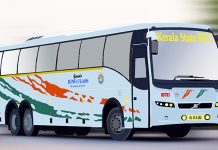The Kerala State Road Transport Corporation (KSRTC) has plans to introduce 650 new buses across the State, including battery-operated electric buses and compressed natural gas-powered buses, as part of its efforts to help the city be pollution-free, according to an affidavit filed by the agency in the High Court.

The KSRTC in its affidavit also said there was a strategic plan to introduce low-carbon city buses in greater Kochi. This would ensure connectivity for the Kochi metro rail project and also rejuvenation of mass transportation facility in the project areas.
The affidavit was filed in response to an appeal by the Lawyers Environmental Awareness Forum (LEAF), challenging the order of a single judge staying the order of the National Green Tribunal, Kochi Circuit Bench, restraining the government from registering diesel vehicles of 2000 cc and above in the State.
Battery-powered buses are absolutely emission-free and CNG-fuelled buses are low on emission. The KSRTC is already in talks with the Indian Oil Corporation for setting up CNG dispensing stations in the vicinity of KSRTC/KURTC depots in the greater Kochi area. It will take at least a year for the proposal to materialise.
The buses operated on battery and CNG will be standard buses and mini buses with a seating capacity of 42 and 27 respectively. The standard buses will mainly be operated as the main connection service between various metro rail stations and satellite town such as Aluva, Cherthala, Vaikom, Pala, Muvattupuzha, Thodupuzha, Mundakayam, Piravom, Angamaly, Chalakudy, Thrissur, North Paravur and Kodungalloor.
The mini buses will be operated to almost all the corners of the city. This will discourage commuters from using personalised modes of transport such as cars and two-wheelers and promote public transportion system.
The KSRTC said the majority of the city services in Kochi were concentrated along National Highway 47 between Aluva and Ernakulam and also from Ernakulam to Tripunithura.
In view of the direct impact of metro rail service on the existing city bus routes operated by KSRTC, route rationalisation of the existing service has also been proposed.
As many as 43 feeder routes have been identified in the catchment areas of the proposed metro stations.
News Source : The Hindu



















